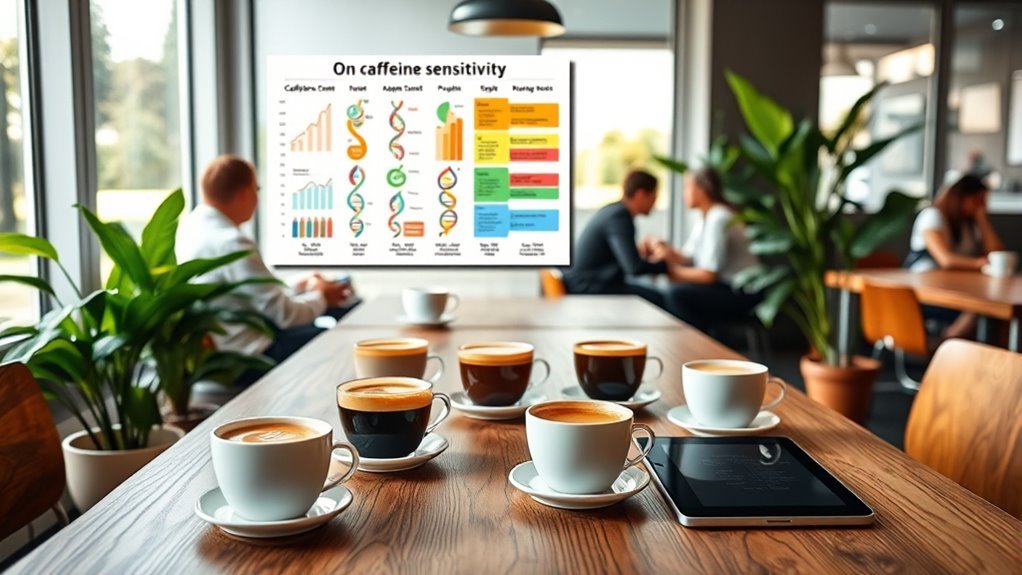The Genetics of Caffeine Sensitivity and Mental Health
Your genetics play an essential role in how your body handles caffeine, determining both your sensitivity and potential mental health effects. Variations in the CYP1A2 gene affect caffeine metabolism speed, meaning some might feel jittery after one cup while others require more. This sensitivity can impact anxiety responses, leading to different mental health outcomes. Understanding your genetic profile can help manage your caffeine consumption effectively, enhancing overall well-being and mental stability—find out how to optimize your intake.
Understanding Caffeine Sensitivity

When you sip your morning coffee, you might not realize that your body’s response to caffeine is influenced by your genetics. Your sensitivity threshold to caffeine varies greatly, affecting how you experience its effects. Some folks metabolize caffeine quickly, feeling energized and alert, while others may experience jitteriness or anxiety even with minimal caffeine consumption. This variance can lead to misunderstandings about your limits and preferences. Understanding your unique sensitivity can empower you to make informed choices about your caffeine intake, ensuring you enjoy its benefits without adverse effects. By recognizing these genetic influences, you can navigate your relationship with caffeine more freely, optimizing your mental well-being and enhancing your daily experiences.
The Role of Genetics in Caffeine Metabolism
Though many people enjoy caffeine’s stimulating effects, the way your body metabolizes it is largely dictated by your genetic makeup. Caffeine genetics plays an essential role in determining how quickly you process caffeine through various metabolic pathways. Genetic variations in enzymes, particularly cytochrome P450 1A2, influence how fast caffeine is broken down in your liver. If you possess a variant that speeds up metabolism, you may tolerate higher caffeine doses without adverse effects. Conversely, slower metabolizers might experience jitters or anxiety even with small amounts. Understanding these genetic factors can empower you to make informed choices about your caffeine consumption, helping you enjoy its benefits while minimizing potential drawbacks. Embracing your unique genetic profile can enhance your caffeine experience.
Variations in Caffeine Response

When you consume caffeine, your body reacts differently based on your genetic makeup. Variations in caffeine metabolism can influence not just how alert you feel, but also your overall mental health. Understanding these genetic factors can provide insight into why some people thrive on coffee while others may experience anxiety or sleep disturbances.
Genetic Factors Influencing Sensitivity
Although caffeine is a widely consumed stimulant, individual responses to it can vary dramatically, largely due to genetic factors. Your sensitivity to caffeine isn’t just a matter of choice; it’s influenced by specific genetic markers that dictate how your body interacts with caffeine receptors. For instance, variations in genes like CYP1A2 can determine how quickly you metabolize caffeine, impacting your overall experience. If you possess certain genetic traits, you might feel jittery or anxious after just one cup, while others may require several to feel the effects. Understanding these genetic influences can empower you to make informed choices about your caffeine consumption, aligning it with your unique biological makeup and mental health needs.
Caffeine Metabolism Variability
Because of genetic differences in caffeine metabolism, individuals can experience a wide range of responses to caffeine consumption. Your caffeine absorption rates can vary markedly based on your genetic makeup, influencing how quickly your body processes this stimulant. Some people may feel jittery after just one cup, while others might sip multiple cups without any noticeable effects. Genetic testing methods can help identify specific variations in genes responsible for caffeine metabolism, providing insights into your unique response. Understanding these differences empowers you to make informed choices about caffeine intake, allowing you to tailor your consumption to suit your body’s needs. This knowledge not only enhances your well-being but also promotes a sense of freedom in managing your caffeine habits.
Impact on Mental Health
Understanding how caffeine affects mental health is crucial, especially since variations in individual responses can lead to vastly different experiences. Your sensitivity to caffeine can influence various aspects of mental well-being, including:
- Caffeine withdrawal: Abrupt cessation may trigger irritability and fatigue.
- Anxiety disorders: High intake could exacerbate symptoms for some individuals.
- Mood regulation: Caffeine might elevate mood temporarily but lead to crashes.
- Stress response: It can heighten physiological stress reactions, affecting overall mental health.
- Sleep disruption: Poor sleep quality can further impact mood and anxiety levels.
Recognizing your unique response to caffeine is essential, helping you make informed choices that promote a balanced mental state and well-being.
The Impact of Caffeine on Mental Health

As you navigate your daily routine, the effects of caffeine on your mental health can be both subtle and profound. While a cup of coffee might boost your energy, it can also lead to mood fluctuations, especially when caffeine withdrawal kicks in. You might find yourself feeling irritable or anxious as your body adjusts. Understanding this delicate balance is essential for maintaining mental well-being.
| Effect | Positive Impact | Negative Impact |
|---|---|---|
| Short-term | Increased alertness | Jitters or anxiety |
| Long-term | Enhanced mood | Dependency and withdrawal |
| Withdrawal Effects | Temporary fatigue relief | Mood swings and irritability |
Recognizing how caffeine interacts with your mental state can empower you to make informed choices about your consumption.
Genetic Factors Linked to Anxiety and Caffeine
Your genetic makeup plays an essential role in how caffeine affects your anxiety levels. Certain genetic variants can influence how your body metabolizes caffeine, potentially heightening feelings of anxiety for some individuals. Understanding these connections can help you navigate your caffeine consumption and its impact on your mental health more effectively.
Genetic Variants and Anxiety
While caffeine is widely consumed for its stimulating effects, its impact on anxiety can vary greatly among individuals, often due to genetic factors. Your genetic predisposition can play a significant role in how caffeine affects your mental health.
Consider these factors:
- Variants in genes affecting neurotransmitter levels
- Increased risk for anxiety disorders in sensitive individuals
- Caffeine withdrawal symptoms exacerbating stress responses
- The role of environmental influences on behavioral health
- Potential benefits of genetic testing for personalized insights
Understanding these genetic variants can empower you to make informed choices about caffeine consumption and anxiety management. By recognizing how your unique genetic makeup interacts with lifestyle factors, you can better navigate your mental health journey.
Caffeine Metabolism Differences
Genetic factors influencing caffeine metabolism can considerably affect how individuals experience its stimulating effects, particularly in relation to anxiety. Your genetic predisposition plays a significant role in determining your caffeine tolerance. Some people metabolize caffeine quickly, allowing them to enjoy its benefits without adverse effects. Others, however, may struggle with heightened anxiety when consuming caffeine, as their bodies process it more slowly. This slower metabolism can lead to increased jitteriness and stress, making it essential to understand your unique genetic makeup. By recognizing these differences, you can make informed choices about your caffeine consumption, ensuring you maintain a balance that supports your mental well-being while enjoying the freedom caffeine can offer.
Impact on Mental Health
Understanding how caffeine interacts with mental health, particularly regarding anxiety, reveals a complex interplay influenced by individual genetic factors. Your genetic makeup can greatly affect how caffeine impacts mood regulation and susceptibility to caffeine addiction.
Consider these points:
- Genetic variations can heighten anxiety responses to caffeine.
- Caffeine may exacerbate existing mood disorders in some individuals.
- Some people metabolize caffeine quickly, experiencing less anxiety.
- Others may feel jittery and anxious, leading to increased caffeine consumption.
- Understanding your genetic profile can help in managing anxiety and caffeine intake.
Recognizing these connections empowers you to make informed choices about caffeine, ultimately supporting your mental health journey and fostering a sense of freedom in how you navigate your daily life.
The Interaction Between Caffeine and Neurotransmitters
Caffeine interacts intricately with neurotransmitters in your brain, influencing mood, alertness, and overall mental health. This caffeine neurotransmitter interaction involves modulation of key neurotransmitters like dopamine and serotonin, which play crucial roles in regulating emotions and cognitive functions. Understanding these interactions can empower you to make informed choices about your caffeine consumption.
| Neurotransmitter | Effect of Caffeine | Implications for Mental Health |
|---|---|---|
| Dopamine | Increases release | Enhanced motivation, pleasure |
| Serotonin | Modulates levels | Improved mood, reduced anxiety |
| Adenosine | Blocked activity | Increased alertness, reduced fatigue |
| Norepinephrine | Boosted release | Heightened focus, energy |
Personalized Caffeine Consumption Recommendations

As you navigate your daily caffeine intake, it’s essential to contemplate how your unique genetic makeup influences your sensitivity to this stimulant. Personalized guidelines can help you find a balance that enhances your mental health without causing adverse effects. Here are some tailored strategies to evaluate:
- Identify your caffeine tolerance: Start with small amounts and observe how you feel.
- Monitor your mental state: Keep track of your mood and anxiety levels in relation to caffeine consumption.
- Time your intake: Avoid caffeine late in the day to promote better sleep.
- Stay hydrated: Balance caffeine with water to mitigate potential negative effects.
- Consult with a healthcare professional: They can provide insights specific to your genetic profile.
Future Research Directions
Research into caffeine sensitivity and its implications for mental health is still evolving, opening up exciting avenues for future investigation. Future research should focus on genetic discoveries that clarify how individual variations influence caffeine interactions and their cognitive effects. Population studies could identify trends linking caffeine consumption with mental health outcomes, revealing how environmental factors shape these relationships. By exploring personalized approaches to caffeine intake, we can better understand its role in mental well-being. As you consider your own caffeine habits, remember that ongoing research may uncover insights that empower you to make informed choices. Ultimately, unraveling these complexities holds the potential to enhance both mental health and quality of life for many individuals.
Practical Tips for Managing Caffeine Intake

While many people enjoy the boost that caffeine provides, managing your intake can greatly impact both your mental health and overall well-being. Here are some practical tips to help you navigate this journey with mindful consumption:
- Set limits: Aim for a daily caffeine cap based on your sensitivity.
- Explore caffeine alternatives: Try herbal teas or decaf options to reduce intake while still enjoying a warm beverage.
- Stay hydrated: Drink plenty of water throughout the day to maintain energy levels without relying on caffeine.
- Monitor your mood: Keep a journal to track how your caffeine consumption affects your mental state.
- Gradual adjustments: If cutting back, reduce your intake slowly to avoid withdrawal symptoms.
Frequently Asked Questions
Can Caffeine Affect Sleep Quality in Sensitive Individuals?
Absolutely, caffeine can greatly affect sleep quality, especially in sensitive individuals. If you consume caffeine close to bedtime, you might experience sleep disturbances that lead to fatigue and irritability. Additionally, caffeine withdrawal can exacerbate these issues, making it harder to fall asleep or stay asleep. Understanding how your body reacts to caffeine is essential for improving your sleep patterns and overall well-being, allowing you to regain that sense of freedom in your daily life.
Is There a Genetic Test for Caffeine Sensitivity?
Yes, there is genetic testing available that can help you determine your caffeine sensitivity. This testing focuses on genes related to caffeine metabolism, particularly the CYP1A2 gene, which plays an essential role in how your body processes caffeine. If you’re someone who experiences adverse effects from caffeine, understanding your genetic makeup might offer valuable insights. It empowers you to make informed choices about your caffeine intake, promoting greater freedom in your daily life.
How Does Age Influence Caffeine Metabolism?
As you age, your body undergoes significant changes, much like a car that needs regular tune-ups to keep running smoothly. These age-related changes can lead to metabolic differences in how you process caffeine. Older adults often metabolize caffeine more slowly, which can affect their sensitivity and overall experience. Understanding this can empower you to adjust your caffeine intake, ensuring you enjoy its benefits without overwhelming your system, fostering a sense of freedom in your choices.
Are There Non-Genetic Factors Affecting Caffeine Sensitivity?
Absolutely, there’re non-genetic factors that can affect your caffeine sensitivity. Environmental influences, like stress levels and sleep quality, play a significant role in how your body processes caffeine. Additionally, your dietary habits—such as what you eat alongside caffeine or your overall nutrition—can also impact your sensitivity. Understanding these factors empowers you to make informed choices about your caffeine consumption, allowing you to enjoy its benefits while minimizing potential downsides.
What Are Common Symptoms of Caffeine Sensitivity?
You might think caffeine’s just a harmless pick-me-up, but if you’re sensitive, it can feel like a rollercoaster of chaos! Common symptoms include jitteriness, heart palpitations, and anxiety reactions that make you feel like you’re on edge. When you try to cut back, caffeine withdrawal can hit hard, leading to headaches and irritability. Understanding these symptoms can help you navigate your relationship with caffeine, giving you the freedom to feel your best.






